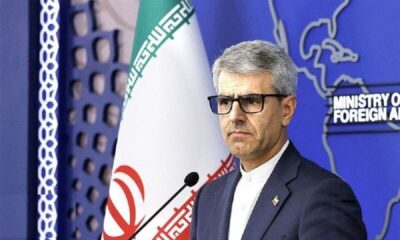Latest News
Malnutrition rates in Afghanistan at record high, WFP warns

Malnutrition rates in Afghanistan have reached record highs with half the country enduring severe hunger throughout the year, a spokesman for the World Food Program said Thursday.
“Half of Afghanistan endures severe hunger throughout the year, regardless of the season, and malnutrition rates are at a record high for Afghanistan,” said Phillipe Kropf, a spokesman for WFP in Kabul, the Associated Press reported.
“There are four million children (under the age of 5) and mothers who are malnourished, in a country with a population of 40 million.
Kropf said Afghans are not starving to death, but they have no resources left to stave off the humanitarian crisis.
Aid agencies have been providing food, education and healthcare support to Afghans, including heating, cash for fuel and warm clothes. But distribution has been severely impacted by an Islamic Emirate of Afghanistan (IEA) order banning women from working at national and international nongovernmental organizations.
“The ban has come at the worst possible moment,” said Kropf. “Families and communities don’t know where their next meal is coming from.”
The WFP scaled up its delivery and distribution of aid in anticipation of a tough winter before the ban came in, planning to reach 15 million this month with emergency food assistance and nutrition support. While it is not directly affected by the ban, 19 of its NGO partners suspended operations in Afghanistan following the Dec. 24 edict.
The highest-ranking woman at the UN Amina Mohammed said Wednesday she used everything in her “toolbox” during meetings with IEA ministers in Afghanistan to try to reverse their crackdown on women and girls.
On Thursday, UN spokesman Stephane Dujarric, on rising malnutrition rates in Afghanistan, said: “It’s yet another sign of the rapidly deteriorating humanitarian situation in Afghanistan we’re seeing in the midst of particularly harsh winter conditions.”
Latest News
Recent attack on Afghanistan was a justified response to Pakistan’s foes: Sharif

Pakistan's Prime Minister, Shehbaz Sharif, recently stated that the military strike on the Barmal district of Paktika province in Afghanistan was an appropriate response to the armed opposition confronting Islamabad.
In a meeting in Islamabad, Sharif warned that Pakistan has, and will continue to deliver a strong and decisive response to cross-border attacks. He emphasized that both internal and external forces are actively working against Pakistan's stability.
"Today, we are addressing the attack on Pakistan that occurred in recent days, and we responded appropriately," Sharif said. "There are still operatives and fighters in Pakistan, particularly in Khyber Pakhtunkhwa and Balochistan, who are plotting against us. We are aware that some who are sitting abroad, posing as friends, are in fact working against Pakistan, which is a serious threat."
However, Pakistani media have reported that the Prime Minister's remarks refer to the influence of the Tehrik-i-Taliban Pakistan (TTP), which operates from Afghan soil and has faced resistance from Pakistani forces. While Pakistani authorities have described the operation as a defensive measure, local sources and Afghanistan's Ministry of National Defense said that the Pakistani airstrike on Barmal district led to civilian casualties, including women and children.
In response to Sharif’s comments, Sher Mohammad Abbas Stanikzai, the Deputy Foreign Minister for Political Affairs, stated that Pakistan's issues are internal and that if Islamabad pursues a path of hostility with Afghanistan, it will ultimately face failure.
Stanikzai also issued a warning, asserting: "If Afghanistan were to send the 'five sons of Mahmud, Abdali, or Babur' across the border, no one—not even in the Indian Ocean—could stop them." He further emphasized that Afghan forces have successfully safeguarded the nation’s borders, adding, "If the enemy has looked at it with an evil eye, they have plucked out their eye."
Experts, however, believe there are contradictions in the views and positions of various Pakistani institutions and officials regarding Afghanistan. While Sharif speaks of military confrontation, Pakistan's Ministry of Foreign Affairs has consistently advocated for diplomacy and expressed a desire for peaceful, friendly relations with Afghanistan.
Latest News
Unemployment rate rising in Herat
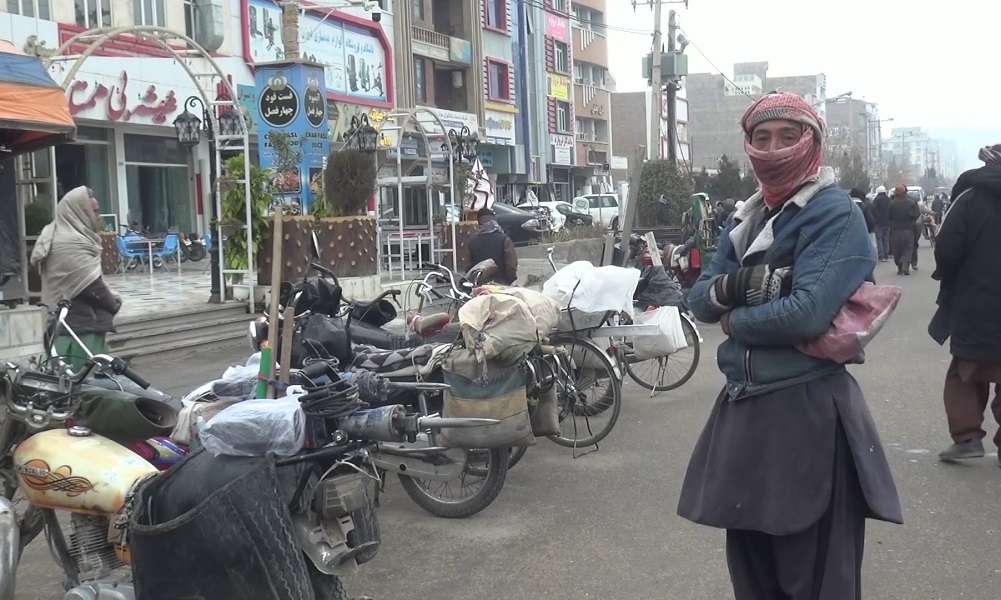
Despite hundreds of small and large factories operating in Herat, unemployment rate is rising in the western Afghan province.
Many laborers wait for work from morning till evening in every corner of the city, with some saying that they cannot find work even in a week.
Life has become difficult for the laborers during the cold winter. They cannot meet their basic living expenses.
Sayed Mahdi was deported from Iran a month ago. He is now looking for work every day. His family is in Iran and he himself spends difficult nights and days in Herat. Like Sayed Mahdi, dozens of other young people wait to find work every day.
“I came to live in my country. But what hope do I have to live with? Should I go and sleep in a mosque? In this cold season, there is no work,” he said.
Mohammad Ali, a laborer, says: “I was deported and I have no proper place to live in. My family is there. My four children are there. They deported me. There are people here whose conditions are much worse than mine.”
Some laborers say that unemployment has increased compared to last year and now they are going through a difficult situation in this cold weather. They say that they cannot afford to pay for their basic living expenses and this situation is bothering them.
“I have not been able to work for two or three weeks. There is unemployment. There are two or three thousand workers here, but there is no work,” says Ahmad Shah, a laborer.
Ghulam Rasool, another laborer, says: “When we go home empty-handed, our child gets upset. But we have no choice. My child has expectations. My wife has expectations.”
Aziz Ahmad waits for work with his tools in another corner of Herat city. He says that job opportunities have decreased greatly, cost of living is high, and there is no work to meet his basic living expenses.
He says: “I stand here from morning to evening, but there's no work."
Local officials have repeatedly said that thousands of people work in the Herat Industrial Park and that efforts are being made to reduce unemployment by launching mining projects.
Latest News
Stanikzai says Afghanistan has fighters who can act like ‘atomic bomb’
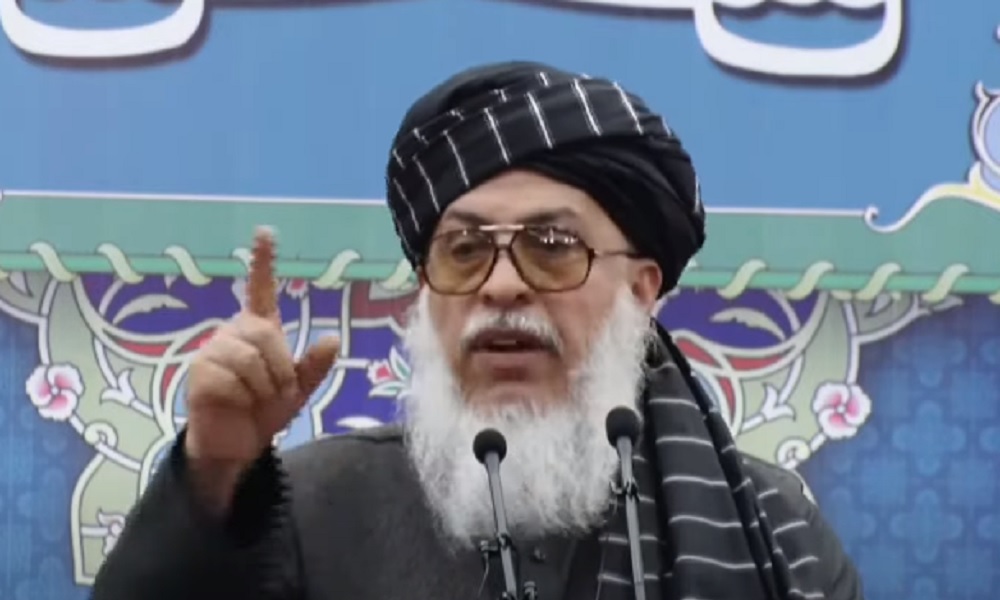
In an apparent warning to Pakistan, Deputy Foreign Minister for Political Affairs Sher Mohammad Abbas Stanikzai said on Saturday that Afghanistan has fighters who can act like “atomic bomb.”
"Today is not the day to work with Kalashnikov. Today, you will not work with M4. Today, you will have fast planes and drones. You will have weapons that the world will fear you,” Stanikzai said addressing a graduation ceremony in Kabul’s Loya Jirga hall. “Neighboring countries are proud of their weapons and claim that the Emirate is nothing in front of them. But we tell them that if you have named your rocket Ahmad and Mahmud, Ahmad and Mahmud themselves are here with us. If you have named your rocket Ghaznavi, Babur or Abdali, my country is full of Abdalis, Mahmuds and Abdalis. Each of them is an atomic bomb.”
Stanikzai warned that if Afghanistan sends “five sons of Mahmud, Abdali or Babur across the border, no one could stop them not even in the Indian Ocean.”
The official said that Afghan forces have successfully protected the country’s borders. "If the enemy has looked at it with an evil eye, they have plucked out their eye."
The remarks come as Pakistan carried out airstrikes in Afghanistan’s Paktika province last month, killing dozens of people. Afghanistan retaliated targeting multiple points in Pakistan.
In his speech, Stanikzai also stressed on the importance of making Afghanistan’s economy self-reliant.
"Any country that is poor is a slave. This is a principle in the world. A hungry and poor person accepts the orders of the rich, and if he does not accept their orders, no one will give him bread. Today, if foreign countries and organizations set conditions in Afghanistan, it is because we are dependent on them. If we were economically self-reliant, we would tell everyone that we will not accept any of your conditions and you should not interfere, but unfortunately, we are dependent for even a sack of flour,” he said.
-

 Latest News4 days ago
Latest News4 days agoSouth Korea pledges $5 million to support vulnerable families in Afghanistan
-

 World5 days ago
World5 days agoUS announces $5.9 billion in military and budget aid to Ukraine
-

 Science & Technology5 days ago
Science & Technology5 days agoUS Treasury says Chinese hackers stole documents in ‘major incident’
-

 Latest News2 days ago
Latest News2 days agoMinistry: $1 billion invested in Afghanistan’s poultry production sector
-
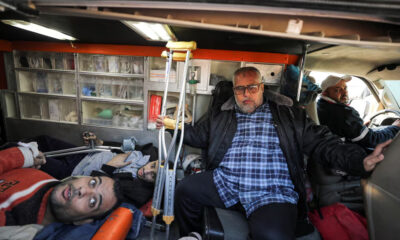
 Regional4 days ago
Regional4 days agoU.N. body accuses Israel of destroying Gaza healthcare
-
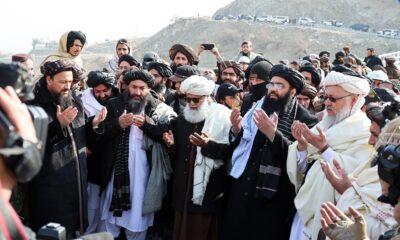
 Latest News4 days ago
Latest News4 days agoShah wa Arus dam inaugurated in Kabul
-
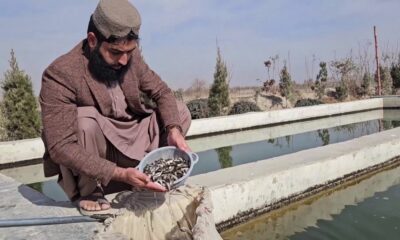
 Latest News2 days ago
Latest News2 days agoDeclining water levels affect 50 percent of fish farms in Kandahar
-

 Regional5 days ago
Regional5 days agoIran confirms arrest of Italian journalist Cecilia Sala










